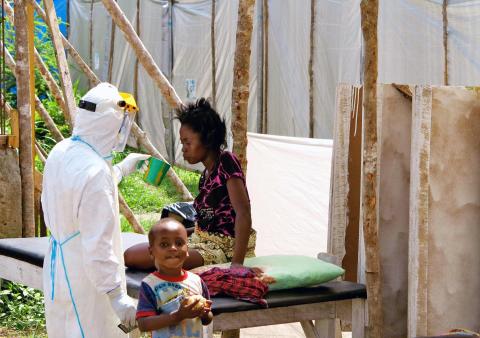Advertisement
Sierra Leone makes harbouring Ebola victims a crime
FREETOWN/ABIDJAN (Reuters) - Sierra Leone's parliament has made the harbouring of Ebola victims a crime punishable by two years' jail in an attempt to stop the spread of the deadly virus, the justice minister said on Saturday.
The decision came as the World Health Organization (WHO) warned that the hiding of victims and the existence of "shadow zones" where medics cannot go has concealed the true scale of the epidemic.
Some 1,427 people have died among 2,615 cases documented since the current outbreak - the worst since the disease's discovery - was first identified in Guinea in March, according to figures released by the WHO on Friday.
Lawmakers in Sierra Leone's capital Freetown voted overwhelmingly in favour of the 2014 Public Health Amendment Act, which amends a 54-year-old public health ordinance.
"The new regulation will provide for summary trial, meaning trial by a magistrate court alone," Justice Minister Frank Kargbo told Reuters.
Under-reporting of Ebola cases has been a problem particularly in Liberia and Sierra Leone, currently the two countries hardest hit by the virus. Nigeria, the fourth country affected, has reported 14 cases of the disease.
Fear, stigma and denial have led many families to hide their infected loved ones from health officials. In other instances, patients have been forcibly removed from treatment facilities and isolation centres, creating the risk of the disease's further spread.
"The amendment is needed at this time taking into account the fact that when the 1960 ordinance was drafted and passed into law, a disease such as Ebola did not exist," said Kargbo, who also serves as Sierra Leone's attorney general.
REGIONAL PANIC
Despite initial assertions by regional health officials that the virus had been contained in its early stages, Ebola case numbers and deaths have increased dramatically in recent months.
As the outbreak has spread across borders from its initial epicentre in Guinea, governments in the region have introduced increasingly strict travel restrictions.
Ivory Coast has closed its land borders Guinea and Liberia to try to prevent the virus from crossing onto its territory, the government announced late on Friday.
Ivory Coast, French-speaking West Africa's largest economy and the world's top cocoa producer, had previously imposed a ban on flights to and from Sierra Leone, Liberia and Guinea.
Liberia's Nimba County, which shares a border with Ivory Coast, has seen the number of Ebola cases balloon in recent weeks. According to Moses Massaquoi, the head of Ebola case management at Liberia's health ministry, 65 cases including 25 confirmed patients have now been reported there.
"The number of cases in Nimba has spiked recently and it is now an area of concern," Massaquoi told Reuters.
The WHO does not recommend travel or trade restrictions for countries affected by Ebola, saying such measures could heighten food and supply shortages. But residents of Ivory Coast's commercial capital Abidjan voiced support for the decision.
"I don't think simply closing the border is enough. We need to go even further," said Romaric Kouadio, a laboratory technician.
The Philippines on Saturday ordered 115 soldiers to return home from peacekeeping operations in Liberia due to the outbreak there.
Brussels Airlines, Belgium's largest carrier, said on Saturday it was cancelling flights to the capitals of Guinea, Liberia and Sierra Leone for Sunday and Monday due to new restrictions put in place by Senegal's aviation authority.
The company's flight to Freetown on Friday was denied permission to land for a crew change at the airport in Senegal's capital Dakar, and the plane was forced to continue on to Casablanca for an unscheduled landing.
Senegal, West Africa's humanitarian hub, had announced earlier in the day that it was banning all flights to and from countries affected by Ebola. It also blocked a U.N. aid plane from landing in Dakar.
"We cannot fly like that. It is pretty dangerous," Paul Delafaille, Brussels Airlines' country manager in Sierra Leone, told Reuters.
A spokesman for the airline, in which Germany's Lufthansa owns a 45 percent stake, said it was exploring options that would allow it to resume service to the three countries.
(Writing by Joe Bavier; Additional reporting by Clair MacDougall in Monrovia and Alain Amontchi in Abidjan; Editing by Stephen Powell)



















Add new comment